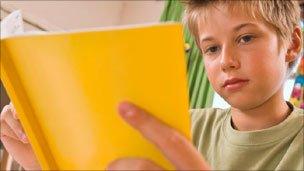New reading test for six-year-olds 'waste of money'
- Published

Ministers say they want to ensures struggling readers are spotted and targeted
The government's new reading test for six-year-olds is a waste of money that will not identify youngsters' needs, experts have warned.
They are "deeply concerned" about the test, and call on the Education Secretary Michael Gove to reconsider its introduction.
The warning comes in an open letter to him signed by representatives of the UK Literacy Association among others.
The Department for Education said those needing help must be identified early.
Plans for a reading test for six-year-olds were announced by the department at the end of last year, amid concerns that children with poor reading skills were slipping through the net.
The test, taken in the final term of Year 1, is based on phonics, which is the decoding of words by sounds, rather than children recognising whole words.
'Pseudowords'
Pupils will be asked to sound out or decode a series of words, some of which are "made up", to test their reading skills.
It is this aspect of the test that most concerns the signatories to the letter, which include John Coe, chairman of the National Association for Primary Education, Rona Tutt, chairman of the National Literacy Association and general secretary of the Voice education union, Philip Parkin.
Last month, a government-commissioned report on a pilot of the test found that while two-fifths of teachers said the check had helped them identify struggling youngsters, there were also some concerns.
The research found 72% of pilot schools said "pseudowords" caused confusion for some, or most, of their pupils.
More than half of schools did not think the test helped to identify pupils with reading problems.
And while three-quarters of schools said the check was accurate overall for their pupils, fewer than half of teachers were confident that the check was accurate for lower-performing pupils, those with special educational needs, those who speak English as an additional language and those with language difficulties.
'Through the net'
The open letter to Mr Gove, printed in the Independent, says: "Many of our original fears have been confirmed by the evaluation report and the undersigned remain deeply concerned about the imposition of this test on all schools in England."
It says that the finding about "pseudowords" confirms their worries that a reading test based only on decoding could harm standards in the long term.
The letter adds: "The government is proposing to spend millions of pounds of taxpayers' money every year on a test which will increase workload, undermine teaching time, fail in its core purpose of accurately identifying children's needs in reading and is unnecessary in promoting the already present teaching of phonics.
"In the light of the findings from the evaluation of the pilot we are sure that ministers will be reconsidering the need for the phonics test for six-year-olds.
"The signatories of this letter would welcome an opportunity to discuss how teacher assessment of reading would identify and help young readers who are slow to start."
The letter has been signed by 19 individuals in total from teaching unions as well as educational associations.
A DfE spokesman said: "Academic research from all around the world - from Australia to the US - shows that systematic synthetic phonics is the best way to teach early reading.
"Pupils who need more help to master phonics need to be identified as early as possible, which is why we will introduce a phonics check for six-year-olds from next year."
She added: "The evidence from the pilot is clear - thousands of six-year-olds, who would otherwise slip through the net - will get the extra reading help they need to become good readers, to flourish at secondary school and to enjoy a lifetime's love of reading."
- Published16 September 2011
- Published19 February 2011